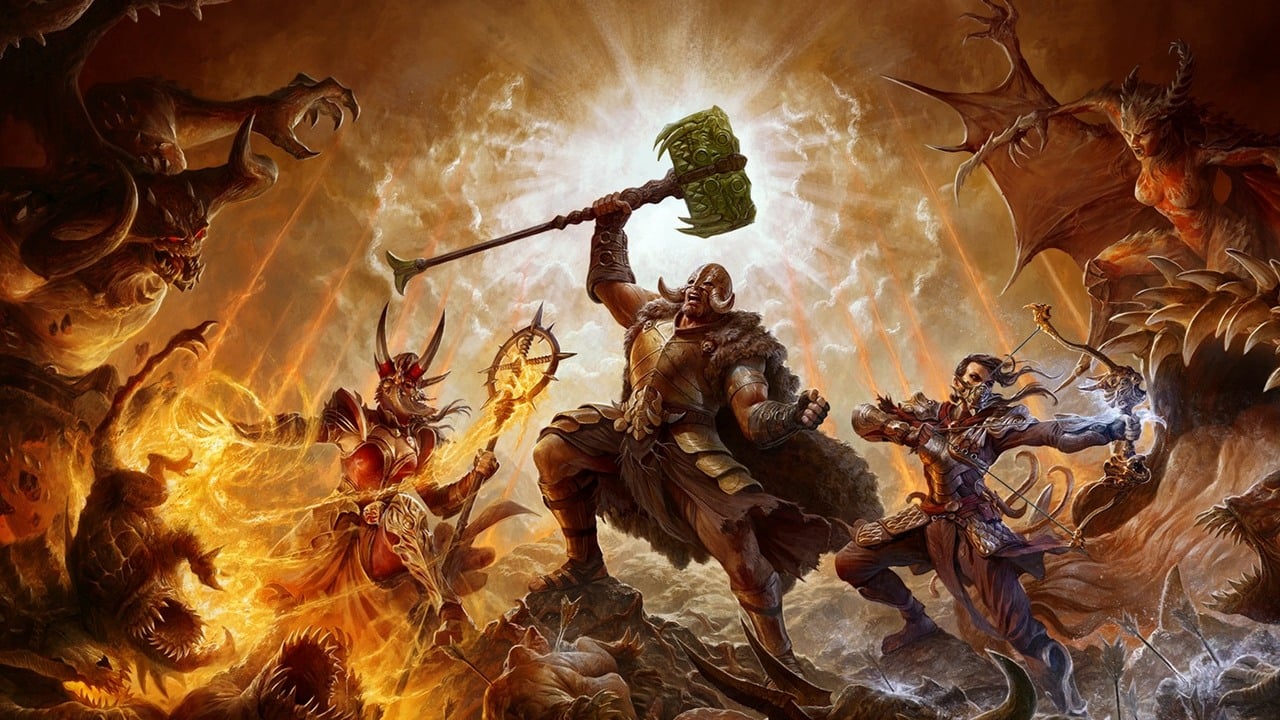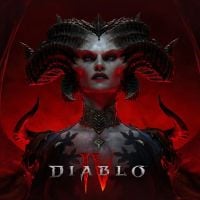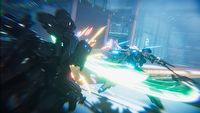„Blizzard's core foundational level is making world class games.” New CEO explains what gamers can expect from legendary dev
Johanna Faries revealed how she sees the future of Blizzard Entertainment under her leadership a year after replacing Mike Ybarra as the studio's head.

"World class games," risky "bets", and more than just "Blizzard Gaming" - this is how the current CEO of Blizzard Entertainment sees the future, a year after replacing Mike Ybarra.
Even though she started her journey with video games at the age of 5 (as she described herself, a typical "Nintendo kid"), Johanna Faries began her career in... the NFL league. Only after 12 years, in 2017, she joined Activision Blizzard as one of the managers of the Call of Duty series - in her opinion, in connection with the company's plans for the e-sports scene.
Faries quickly climbed the corporate ladder (she was featured in the Variety500 rankings in 2022 and 2023) before taking over at Blizzard Entertainment a year ago.
Old fans and new audiences
Johanna Faries was asked about her experiences after her first year as the head of Blizzard Entertainment in a conversation with Jez Corden from Windows Central. The journalist was curious about how the American woman found herself in the current market situation, filled with competition for the leading titles of the studio—from Marvel Rivals and Path of Exile 2 to the next "conquerors" of World of Warcraft.
She mentioned the "hyperdynamics" of the video game industry, in which many of the previously leading players in the market are trying to find their place - including Blizzard Entertainment. One of the key issues is the generational change. The developers need to satisfy both the veterans, who have been with Blizzard for up to 20 years, and the new audience, who might have entirely different expectations.
You want to retain the players who have been with you going on 20 years in some cases. They have a certain set of expectations. Taking World of Warcraft as an example, you can't have every expansion being such a 'zag' that it feels totally unfamiliar to your core fanbase.
At the same time, there's a constant conversation — which I'm really edified by frankly — about remaining core to what we are, while also broadening the aperture.
This is clearly seen in the example of World of Warcraft, which, on one hand, offers experiences for veterans of this MMORPG (also in the form of "classic" servers), and on the other hand, its devs are experimenting more with the game formula. This results in not only unusual new features but also, among other things, Delves from The War Within. These last ones particularly please Faries, who herself prefers single-player titles.
Of course, this also includes developers who focus on "content" and therefore have slightly different expectations. So developers, not just Faries, are constantly discussing how to maintain a balance between loyalty to "core" fans and trying to reach new audiences, as well as satisfying "hardcore" players, "casuals" and influencers. And at the very least, ensuring that none of these groups have too many reasons to complain.
Expectation bar reinvented
It should be noted that in the case of WoW, Blizzard remains on the MMO throne. Sure, there are other titles with loyal fan bases or that are gaining considerable popularity. However, for 20 years, no game has seriously threatened the position of World of Warcraft.
The same cannot be said about other Blizzard titles. Both Overwatch and Diablo have fierce competition. It wouldn't be an overstatement to claim that the competitors of these games dominate the market.
On Steam, Marvel Rivals and Path of Exile 2 have left OW 2 and Diablo IV far behind in terms of player number. We should remember those playing via Battle.net, and the second Overwatch doesn't cause the developers any embarrassment (except perhaps for the Steam reviews). Nonetheless, this doesn't change the fact that these competitive titles are the undisputed leaders in hero shooters and hack-and-slash games, respectively.
How Blizzard reacts? Faries points out, among other things, the return of the studio's games to China following a tumultuous split with NetEase, as well as the ambition of talented employees who are not only capable of raising the bar but also of "reinventing" it, and the necessity for "reinvention" and surprising players—even by meeting their requests, which the developers had dismissed for many years.
Of course, houses in Azeroth or perks in OW 2 are just the visible effect of actions within the studio itself. After taking the helm at Blizzard, Faries aimed to focus more on promoting "fair, strategic, and cross-functional conversations" that would allow the "best and brightest programmers in the world" to have their say.
Blizzard Entertainment, not Blizzard Gaming
These meetings, reportedly involving the "entire" company, are credited with the recent "risky" changes in Blizzard's games, which have mostly been applauded by fans (albeit with some reservations, particularly regarding perks in OW 2 or Seasons in Diablo 4). But that's not all, because Faries also mentioned "future, unannounced" decisions (or, as she put it, "risky bets" of the company).
In response to Corden's question about specifics (the return of well-known series like StarCraft or active development of Heroes of the Storm), Faries refused to provide details. The same applied to the general plans for the future of the studio, but its boss pointed out that her company is Blizzard Entertainment, not "Blizzard Games." In other words, Blizzard might think about branching out into other media, with Faries highlighting that not every idea will be appropriate, and the crucial factor will be the "execution" of these projects.
Nonetheless, she immediately added that creating "world class games" is the foundation for Blizzard.
The short answer is, we're looking at everything, and I mean that very intentionally — and I can't share anything specific today — but we talked again as recently as yesterday, that we have a strong collective belief that we are Blizzard Entertainment, and not simply Blizzard Games or Blizzard Gaming.
Our universes, our iconic IP can vector off into many interesting dynamic directions. We have to be thoughtful, responsible stewards of those franchises, right? Not everything will fit, and execution absolutely matters. We do think about what we can do to show up for the entertainment industry, as broadly as we can describe, so Blizzard can continue to be a beacon of that sort of ... magic making, fostering joy.
Blizzard's core foundational level is making world class games, but some people will go to BlizzCon and have their life changed. Meet their life partner. Some people will have a reunion gathering and watch that old Warcraft movie.
That's part of what it means to stay in culture, and continue to shape it. So absolutely, that's the lens we're looking through here.
Actions, not words
It must be admitted that the recent changes in Blizzard's games have indeed slightly improved the studio's image. Nonetheless, there are still plenty of complaints to be found. If not about the changes themselves or the way they were introduced (mainly in Diablo 4, but also in OW 2), then about their late implementation.
Some fans cynically note that in the case of Diablo and Overwatch 2, strong competition was needed for the devs - who, according to fans, might have wanted to make these "risky" decisions earlier - to finally be able to implement the changes anticipated by the fans of these titles.
As a result, it's fairly common to hear opinions describing the interview with Johanna Faries as "corporate jargon" and hollow, unclear promises. Even if Faries inspires more trust than one of the previous Blizzard CEOs, players want to see something more than just vague and noncommittal words. Of course, fans are hoping for this, but for now they are holding back their enthusiasm.
0

Author: Jacob Blazewicz
Graduated with a master's degree in Polish Studies from the University of Warsaw with a thesis dedicated to this very subject. Started his adventure with gamepressure.com in 2015, writing in the Newsroom and later also in the film and technology sections (also contributed to the Encyclopedia). Interested in video games (and not only video games) for years. He began with platform games and, to this day, remains a big fan of them (including Metroidvania). Also shows interest in card games (including paper), fighting games, soulslikes, and basically everything about games as such. Marvels at pixelated characters from games dating back to the time of the Game Boy (if not older).
Latest News
- Free FPS on Half Life engine gets big update
- On February 3, gaming history could change forever. Red Dead Redemption 2 one step away from a major achievement
- This is not the RPG you expected. Crimson Desert abandons the key elements of the genre, going for original solutions
- Nintendo may unexpectedly beat Sony. State of Play is not to be the only game show awaiting players in February
- WoW's housing system will get some unexpected features any day now. Blizzard has detailed the development plan for its blockbuster after WoW: Midnight release


